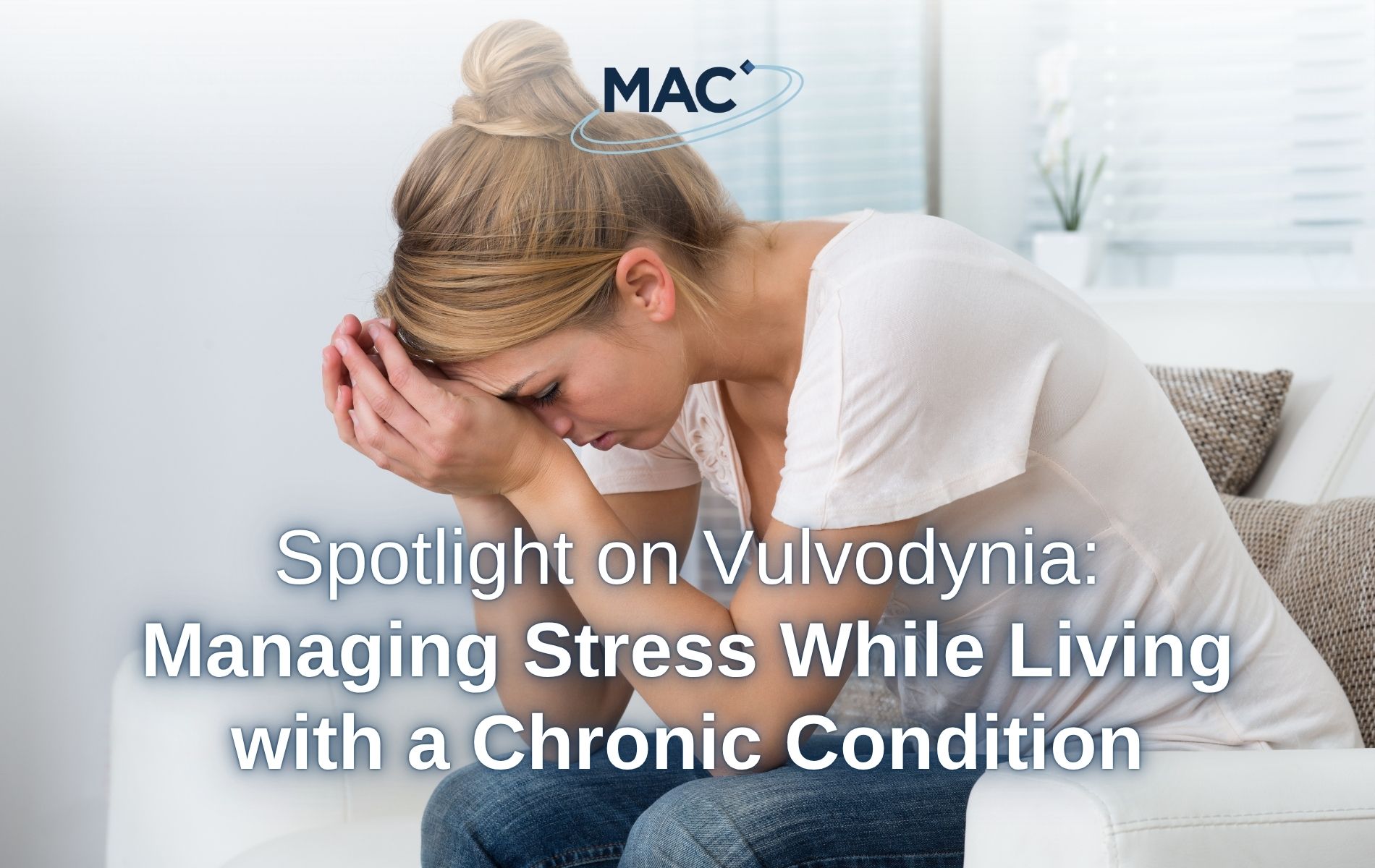Living with a chronic condition such as vulvodynia (chronic pain or discomfort in the vulva that has no clear cause) can be physically demanding and mentally draining. Around 60% of individuals living with a chronic medical condition experience psychological distress, and they are three times more likely to experience this than the general population1. This International Stress Awareness Week, we’re highlighting the importance of stress management for those living with a long-term illness.
Why stress management matters in chronic illness
Chronic conditions are long-lasting and often interfere with day-to-day life. Many of these conditions do not have a cure and cause a significant emotional and social toll.
Living with a long-term condition can be disruptive and can potentially cause financial challenges, missed activities and loss of hobbies2, social isolation3, and significantly reduced quality of life4. For example, those living with vulvodynia often experience perceived injustice, depression, and anxiety5. Due to its association with sexual function, vulvodynia can also cause body-image concerns and issues with self-esteem, which can contribute to distress5.
Managing a chronic pain condition alongside these additional challenges can increase stress levels, which can then have a negative impact on overall health. Pain and stress have a bidirectional relationship, whereby pain triggers the body’s stress response, and stress aggravates chronic pain6. This creates a vicious cycle that’s difficult to break. For those with vulvodynia, symptoms are closely tied to stress, and symptoms can worsen as stress increases7.
Chronic stress interferes with the immune response, leading to increased inflammation and susceptibility to infection8. Inflammation is a central mechanism in vulvodynia, and as it increases, so does vulval sensitivity, worsening symptoms9.
Managing stress with a chronic condition
While chronic illness can lead to increased stress, with effective techniques, stress can be managed and quality of life improved. You may even experience a reduction in some of your symptoms, such as pain. Here at MAC, we’ve collated some stress management tools that may help:
1. Mindfulness
Mindfulness techniques, such as meditation and deep breathing, can help to centre you in the present, away from stressful thoughts. Taking part in a structured intervention like a Mindfulness-Based Stress Reduction programme has been found to help participants with chronic health conditions cope better with symptoms, improve wellbeing and quality of life, and enhance health outcomes10.
2. Progressive muscle relaxation
Progressive muscle relaxation (PMR) involves focusing on one muscle group at a time and methodically tensing and relaxing this area, with the goal of increasing your awareness of this tension. PMR has been found to reduce stress and improve sleep for various chronic conditions, as well as having a positive effect on depression and anxiety symptoms11.
3. Biofeedback
Heart rate variability biofeedback (HRVB) trains individuals to regulate their body through slow, paced breathing while they are provided with real-time feedback on their heart rate and respiration. The technique has shown some promise in reducing stress and anxiety, particularly in those with long-term health conditions12. By becoming more aware of your response to stress, you may be able to train your body to respond more calmly to stressors.
4. Self-care
Practising self-care through a balanced diet, staying hydrated, sufficient sleep, and regular physical activity suited to your needs can help boost mood and control stress levels. Try to give yourself grace on days when this isn’t possible and concentrate on what you can accomplish instead of what you can’t.
What works for others may not work for you, so it is important to try different things to manage your stress. Your GP or mental health professional can provide you with guidance on how best to tackle stress with consideration for your lifestyle and health needs.
Improving quality of life
Receiving effective treatment for a chronic condition is a key factor in reducing stress. For those living with vulvodynia, existing treatments such as topical medications, nerve blockers, and oral pain medications may not provide relief, making the development of new treatments vital.
MAC Clinical Research is conducting a new study for a potential vulvodynia treatment, but we need your help. If you have a diagnosis of vulvodynia (provoked vestibulodynia), with pain experienced for at least 12 months, you may be eligible to participate. You could help generations to come, plus, if eligible, you will receive up to £1730 for your time and commitment upon completion of the clinical trial.
For more information and to register your interest, please visit our vulvodynia research webpage.
References
1 Tareke et al. (2022) – Psychological distress among people living with chronic medical illness and the general population, Northwest Ethiopia: A comparative cross-sectional study
2 Cleveland Clinic – What Is a Chronic Illness? How To Cope
3 Mental Health Foundation – Long-term physical conditions and mental health
4 Hu et al. (2024) – The impact of chronic diseases on the health-related quality of life of middle-aged and older adults: the role of physical activity and degree of digitization
5 NIHR – The silent and widely impacting cost of Vulvodynia: lessons learned and future recommendations
6 London Pain Clinic – Management of Stress and Chronic Pain
7 Mayo Clinic – Vulvodynia – Diagnosis and treatment
8 Alotiby (2024) Immunology of Stress: A Review Article
9 Pelvic Pain Support Network – Vulval Pain
10 Merkes (2010) – Mindfulness-based stress reduction for people with chronic diseases
11 Maritescu et al. (2025) – The Effects of Progressive Muscle Relaxation on Mental Health and Sleep Quality in Adults with Cystic Fibrosis: A Randomized Controlled Trial
12 Fournié et al. (2021) – Heart rate variability biofeedback in chronic disease management: A systematic review




